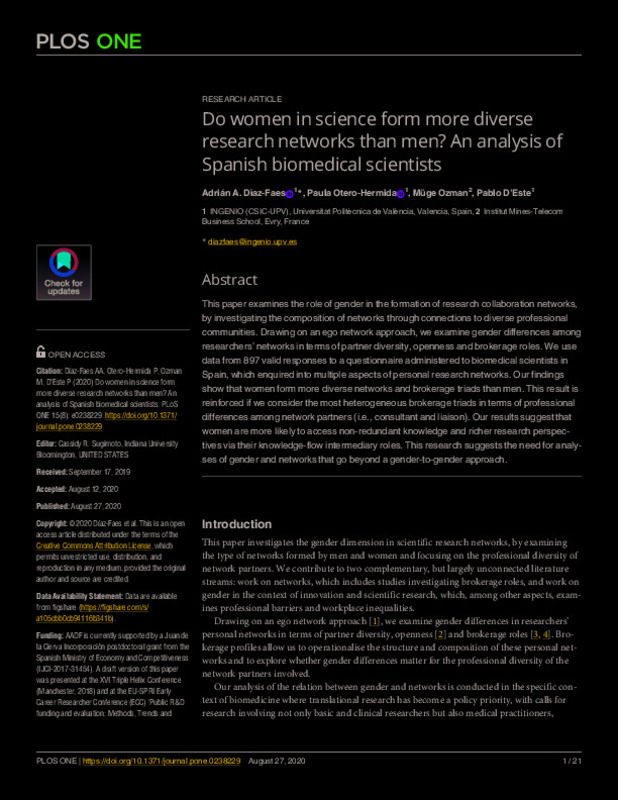JavaScript is disabled for your browser. Some features of this site may not work without it.
Buscar en RiuNet
Listar
Mi cuenta
Estadísticas
Ayuda RiuNet
Admin. UPV
Do women in science form more diverse research networks than men? An analysis of Spanish biomedical scientists
Mostrar el registro sencillo del ítem
Ficheros en el ítem
| dc.contributor.author | Arias-Diaz-Faes, Adrian
|
es_ES |
| dc.contributor.author | Otero-Hermida, Paula
|
es_ES |
| dc.contributor.author | Ozman, Müge
|
es_ES |
| dc.contributor.author | Deste Cukierman, Pablo
|
es_ES |
| dc.date.accessioned | 2023-05-08T18:02:20Z | |
| dc.date.available | 2023-05-08T18:02:20Z | |
| dc.date.issued | 2020-08-27 | es_ES |
| dc.identifier.issn | 1932-6203 | es_ES |
| dc.identifier.uri | http://hdl.handle.net/10251/193227 | |
| dc.description.abstract | [EN] This paper examines the role of gender in the formation of research collaboration networks, by investigating the composition of networks through connections to diverse professional communities. Drawing on an ego network approach, we examine gender differences among researchers¿ networks in terms of partner diversity, openness and brokerage roles. We use data from 897 valid responses to a questionnaire administered to biomedical scientists in Spain, which enquired into multiple aspects of personal research networks. Our findings show that women form more diverse networks and brokerage triads than men. This result is reinforced if we consider the most heterogeneous brokerage triads in terms of professional differences among network partners (i.e., consultant and liaison). Our results suggest that women are more likely to access non-redundant knowledge and richer research perspectives via their knowledge-flow intermediary roles. This research suggests the need for analyses of gender and networks that go beyond a gender-to-gender approach. | es_ES |
| dc.description.sponsorship | AADF is currently supported by a Juan de la Cierva Incorporacion postdoctoral grant from the Spanish Ministry of Economy and Competitiveness (IJCI-2017-31454). A draft version of this paper was presented at the XVI Triple Helix Conference (Manchester, 2018) and at the EU-SPRI Early Career Researcher Conference (ECC) 'Public R&D funding and evaluation: Methods, Trends and Changes' (Rome, 2018). The funders had no role in study design, data collection and analysis, decision to publish, or preparation of the manuscript. | es_ES |
| dc.language | Inglés | es_ES |
| dc.publisher | Public Library of Science | es_ES |
| dc.relation.ispartof | PLoS ONE | es_ES |
| dc.rights | Reconocimiento (by) | es_ES |
| dc.title | Do women in science form more diverse research networks than men? An analysis of Spanish biomedical scientists | es_ES |
| dc.type | Artículo | es_ES |
| dc.identifier.doi | 10.1371/journal.pone.0238229 | es_ES |
| dc.relation.projectID | info:eu-repo/grantAgreement/MINECO//IJCI-2017-31454//Juan de la Cierva Incorporacion postdoctoral grant/ | es_ES |
| dc.rights.accessRights | Abierto | es_ES |
| dc.description.bibliographicCitation | Arias-Diaz-Faes, A.; Otero-Hermida, P.; Ozman, M.; Deste Cukierman, P. (2020). Do women in science form more diverse research networks than men? An analysis of Spanish biomedical scientists. PLoS ONE. 15(8):1-21. https://doi.org/10.1371/journal.pone.0238229 | es_ES |
| dc.description.accrualMethod | S | es_ES |
| dc.relation.publisherversion | https://doi.org/10.1371/journal.pone.0238229 | es_ES |
| dc.description.upvformatpinicio | 1 | es_ES |
| dc.description.upvformatpfin | 21 | es_ES |
| dc.type.version | info:eu-repo/semantics/publishedVersion | es_ES |
| dc.description.volume | 15 | es_ES |
| dc.description.issue | 8 | es_ES |
| dc.identifier.pmid | 32853227 | es_ES |
| dc.identifier.pmcid | PMC7451541 | es_ES |
| dc.relation.pasarela | S\424720 | es_ES |
| dc.contributor.funder | Ministerio de Economía y Competitividad | es_ES |








